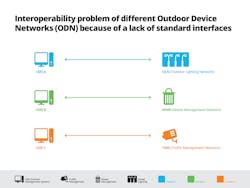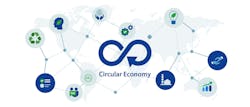Certified TALQ smart city offerings expand, organization warns of false claims
The TALQ Consortium has diligently pursed an industry standard that could enable interoperable products from different vendors in smart-city solid-state lighting (SSL) applications. TALQ created a modular concept model for what was originally a connected street-light system, later expanded the concept to smart city scope, and has developed and published standards for the interfaces between modules. And now the consortium says it has certified 17 products from vendors in nine countries, including both Central Management Software (CMS) packages and what the consortium calls an Outdoor Device Network (ODN) that is essentially a gateway to the nodes in a system. Meanwhile, the consortium warns that some other companies are claiming TALQ compatibility without passing products through the formal certification process.
The TALQ standardization effort was intended to allow municipalities to purchase smart-city systems without being locked into a single vendor. Many such platforms are proprietary today. But a TALQ-based deployment could be extended or upgraded in the future with products from other TALQ-compliant vendors. Indeed, a city might have sub-networks spread around the overall network with the sub-networks coming from many different vendors.
We began covering TALQ nearly a decade ago. Around five years ago, the organization coalesced to the basis of what is in the standard today and in fact contributed an article on the state of the standard at that time. In late 2018, the consortium held its first plugfest for interoperability testing. And by the middle of last year, the organization had begun interoperability testing to ensure compliance.
In announcing its latest certified product results, the consortium is both trying to emphasize the benefits of compliance and to ensure the standard is not besmirched by false claims of compliance, especially in cases where a product is not interoperable.
The companies that have passed through the certification program have different reasons to have gone through the integration of TALQ interfaces in their products. “Citégestion is specialized in monitoring platforms for cities. We quickly noticed that linking our solution with a rather large number of street lighting suppliers was a challenge. It became even more true when it embraces smart cities’ concerns, with an even larger number of device providers,” said Gautier Perraut, technical director at Citégestion. “Therefore, from the very beginning, we always thought that standardizing the communication protocol between the node providers and the software editors was key to strengthening the adoption of smart solutions by cities.”
Still, it’s the freedom to choose interoperable products that is ultimately the biggest benefit. “As a member of the TALQ Consortium, with TALQ version 2 Gateway Certification, we are helping cities unlock vendor tie-in with a proven industry open-protocol standard,” said John Fox, managing director at Lucy Zodion. “Our Ki. solution has been tested against the Certification Tool, making it compatible with other smart city platforms — providing city leaders with the ability to build a future-proof, scalable, and multi-vendor smart city.”
Itron is another proponent of the TALQ standard and of open standards in general. That company contributed a comprehensive contributed article on the many different standards that can come into play at different levels of a smart city network.
“We believe that robust and interoperable standards are key to giving cities the confidence needed to adopt smart city solutions at scale, without fear of vendor lock-in, and have been strong advocates of the TALQ Consortium since its formation,” said Brian McGuigan, smart city lead for Itron. “Since certifying in 2017, we have been using the TALQ v1.0 standard to manage over 3 million lighting points deployed globally, and are excited about the extended functionality and improved interoperability offered by the TALQ v2.0 standard.”
The TALQ website lists all certified products.





